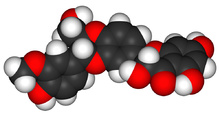Silibinin
 |
|
 |
|
| Clinical data | |
|---|---|
| AHFS/Drugs.com | International Drug Names |
| Routes of administration |
Oral Intravenous |
| ATC code | A05BA03 (WHO) |
| Identifiers | |
|
|
| CAS Number |
22888-70-6 |
| PubChem (CID) | 31553 |
| ChemSpider |
29263 |
| UNII |
4RKY41TBTF |
| KEGG |
D08515 |
| ChEBI |
CHEBI:9144 |
| ChEMBL |
CHEMBL9509 |
| ECHA InfoCard | 100.041.168 |
| Chemical and physical data | |
| Formula | C25H22O10 |
| Molar mass | 482.44 g/mol |
| 3D model (Jmol) | Interactive image |
|
|
|
|
|
|
|
Silibinin (INN), also known as silybin (both from Silybum, the generic name of the plant from which it is extracted), is the major active constituent of silymarin, a standardized extract of the milk thistle seeds, containing a mixture of flavonolignans consisting of silibinin, isosilibinin, silicristin, silidianin, and others. Silibinin itself is mixture of two diastereomers, silybin A and silybin B, in approximately equimolar ratio. The mixture exhibits a number of pharmacological effects, particularly in the liver, and there is some clinical evidence for the use of silibinin as a supportive element in alcoholic and child grade 'A' liver cirrhosis.
Poor water solubility and bioavailability of silymarin led to the development of enhanced formulations. Silipide (trade name Siliphos), a complex of silymarin and phosphatidylcholine (lecithin), is about 10 times more bioavailable than silymarin. An earlier study had concluded Siliphos to have 4.6 fold higher bioavailability. It has been also reported that silymarin inclusion complex with β-cyclodextrin is much more soluble than silymarin itself. There have also been prepared glycosides of silybin, which show better water solubility and even stronger hepatoprotective effect.
Silymarin, as other flavonoids, has been shown to inhibit P-glycoprotein-mediated cellular efflux. The modulation of P-glycoprotein activity may result in altered absorption and bioavailability of drugs that are P-glycoprotein substrates. It has been reported that silymarin inhibits enzymes and an interaction with drugs primarily cleared by P450s cannot be excluded.
A phase I clinical trial in humans with prostate cancer designed to study the effects of high dose silibinin found 13 grams daily to be well tolerated in patients with advanced prostate cancer with asymptomatic liver toxicity (hyperbilirubinemia and elevation of alanine aminotransferase) being the most commonly seen adverse event.
...
Wikipedia
